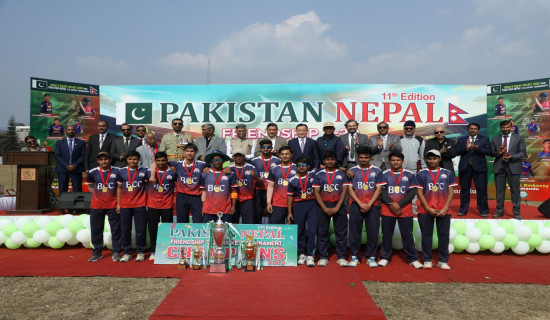- Monday, 16 February 2026
Empower Community To Upgrade Schools
A new leadership has been inducted into Ministry of Education, Science and Technology which has raised expectations on the education sector reforms in the country. Both higher education and school education are in a state of predicament in Nepal. A well-thought-out intervention is called for in injecting reforms to improve and strengthen the sector. With Sumana Shrestha at the helm of affairs of the education ministry, both institutional and functional changes that bedevil the education sector will presumably be initiated. However, unless community ownership and elite stockholding was restored, it would be very much difficult to improve the school sector. This article seeks to shed some light on the state of elite stockholding and ownership of schools at the local level in Nepal.
The government-aided schools are known as community schools to signify that such education institutions should have mutually collaborative relationship with the community. There was a time during mid-Seventies in Nepal when community-school relationship was weakened, as most of the school institutions had been brought under the ambit of the government. The positive aspect of the government intervention in those days was that the teachers’ qualifications and their perks was standardised and regularised accordingly. The government defined and approved curricula was introduced at the school level.
Centrality of citizens
But later the education act was amended to enhance the role of the community to manage the schools not only to offload the burden over to the grassroots. However, it was commented that this was done in line with the principle of new public management (NPM) which was reportedly advocated and promoted by the World Bank. NPM has been a widely followed approach especially in the liberal world to run public service organisations and service delivery institutions, both at sub-national and national levels. The term was introduced in the developed world to describe approaches as part of an effort to make the public services more businesslike and to improve their efficiency and effectiveness. The reforms often focus on the centrality of citizens and customers who were the recipient of the services. NPM reformers experimented with using decentralised service delivery models to give local agencies and communities more freedom and responsibility in how they deliver programmes.
But the model did not work as satisfactorily as it was intended to do. In Nepal’s case, the dynamics of the school management committees took manifestation in uglier forms at a time when the country was passing through the critical political transition. The local bodies had been bereft of the elected representatives for a considerable length of time. The school management committees (SMCs) had been played out as the forums where political parties could compete for space to influence the local community dynamics. SMCs turned into theatrics of political competition among political stakeholders.
According to the reports, millions of rupees used to be spent in the elections for SMCs especially in the Madhes and inner Terai districts. But the situation underwent change after the local elections was held in 2017 in line with the provision of federal democratic constitution 2015. The arena of political conflict took a shift to local government leaving the SMCs as the forum where, in some cases, corrupt practices had been allowed to grow and thrive.
Despite the dismal situation, the scenario changed following implementation of federal constitution in 2015. The constitution devolved and transferred mandate and competence related with school education to local municipalities in line with the principle of subsidiarity. Emboldened and encouraged by the mandate, some local governments enacted local education laws in contravention to the provisions of the existing education act. Accordingly, Kathmandu Metropolitan Corporation (KMC) enacted the new decision to vest stewardship of the school management committee in the politically elected ward committee chairpersons.
The decision of the KMC was opposed tooth and nail from all quarters including the academic community in the country. Consequently, this issue was taken to the Supreme Court. The Court in its ruling given, the other day, directed that the SMC be chaired by a person elected by the parents from among themselves, not the ward committee chief having partisan backgrounds and politicised stakes at the local level.
Learning outcome
SMCs, according to law, have several functions that include monitoring the working of the school, preparing school development plan, allocating and utilising the grants received from the government and so on. Apart from this, SMC should ensure that teachers maintain regularity and punctuality in attending school, hold regular meetings with parents and guardians and appraise them about teaching learning situation. SMCs are thus required to play a key role in building and strengthening relationship between the school and local communities. When the right of free and compulsory school education is enshrined in the constitution, the responsibility of SMC has been to encourage community and more particularly parental involvement in school development. Parental responsibility should therefore be encouraged as educators, partners and decision makers.
Moreover, community schools should foster curricula that is locally relevant and useful. SMC should have an emphasis on high-quality teaching and learning and provide wrap-around supports such as health care and social and emotional services to the students. Moreover, school teachers need to be made committed to achieve transformative learning outcome to cope with new challenges of the fast evolving world. The new education minister is expected to work towards this direction. At this backdrop, emphasis should, therefore, be laid not on tinkering with existing structure of the SMC but implementing actions that build their capacity to govern the schools in a democratic and participatory manner. Municipal governments should be at the forefront to support SMCs for an improved collaborative relationship and transformative learning ambience at the local level.
(The author is presently associated with Policy Research Institute (PRI) as a senior research fellow. rijalmukti@gmail.com)

















